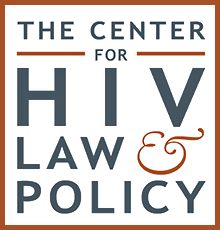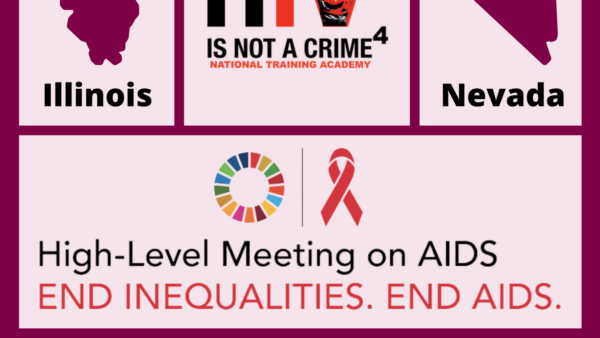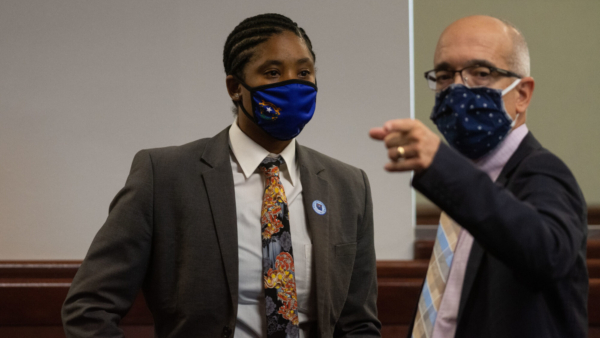Overview
Nevada introduced HIV-specific laws in 1987 and 1993 which criminalised perceived ‘exposure’ to HIV transmission both in general terms and specifically through sex work. In 2021 Nevada modernised its laws, repealing its HIV-specific provisions and treating HIV equally with other communicable diseases under the law.
Before reform, Nevada law made it a felony for people living with HIV to ‘intentionally, knowingly or wilfully’ engage in conduct which is intended to or likely to cause HIV transmission. In addition to this broad provision, the law also prohibited people living with HIV from engaging in sex work. None of Nevada’s HIV-specific laws required transmission to actually take place, and both intentional and unintentional ‘exposure’ were liable to the same punishment.
An analysis by the Williams Institute on enforcement of HIV laws in Nevada showed that between 1995 and May 2021, 47 individuals had been charged with 95 separate HIV-related crimes. 58 of these charges fell under the sex work provision, while the remaining 37 related to the general HIV law. Less than one third of charges resulted in convictions (28). Despite improvements in the understanding of risk behaviours and advancements in HIV treatment, the number of prosecutions rose across each of the three decades they were in force, with 2013-2015 seeing the peak number of cases. Black people were significantly over-represented in the data, making up 40% of arrests despite being only 28% of people living with HIV in Nevada.
Due to the lack of development of these laws to keep in line with latest medical knowledge, a coalition of state and national organisations dedicated to HIV reform joined together as the Nevada HIV Modernization Coalition to advocate for reform. The coalition consisted of more than 20 organisations that support people living with HIV, LGBTQ people, and women, as well as civil liberties organisations. This coalition worked closely with public health and policy experts to advance the case for reform to lawmakers.
Aware of criticisms of the law, the Nevada legislature created the HIV Modernization Task Force in 2019, with the function of developing specific recommendations for reform. The Task Force called for a shift in the response to HIV away from criminalisation and towards treating it as a public health issue. While the Task Force did not call for total decriminalisation, it did call for lowering the penalties from felony to misdemeanour. It also recommended the removal of acts which cannot transmit HIV from the scope of the law, such as biting and spiting, and for the repeal of laws which required HIV testing and sentence enhancements for people living with HIV arrested for engaging in unlicensed sex work.
In 2021, these improvements to the law were realised. Senate Bill 275 was introduced by Democratic Senator Dallas Harris, and after being approved by the House of Representatives, was passed by the Senate with bi-partisan support. It was signed into law by Governor Sisolak in June 2021.
This reform made a number of significant changes to the law. The HIV-specific provisions were repealed, with perceived ‘exposure’ to HIV now being liable to misdemeanour prosecution under a general communicable disease law. This provision prohibits people living with any communicable disease (including HIV) from engaging in any conduct or occupation from which there is a ‘high probability’ of transmission of that disease. If someone living with a relevant disease breaches this obligation, the health authorities can deliver a written warning identifying the offending behaviour and precautions that they must take to prevent future ‘exposure’. If that person commits a violating act for a second time, they are liable to prosecution and a misdemeanour sentence of up to six months’ imprisonment and/or a fine.
There is no requirement of intent to commit the offence under this part of the law, but those charged must be aware of their status and can only be prosecuted after an appropriate warning is served. A separate section of the same offence deals with perceived ‘exposure’ with intent to transmit a disease, applying the same sentence for a first offence (no warning is given) of engaging in conduct with a ‘high probability’ of transmission, but importantly, the conduct must result in transmission.
The new law also contains some defences and limitations which further reduce the scope of criminalisation. Firstly, it is a defence to prove that the other party was aware of their status and consented to the risk. Furthermore, it is a defence to take or attempt to take measures to prevent transmission, and failure to take preventative measures cannot be used as evidence of intention to transmit. Additionally, the provision specifically excludes the donation of blood and other bodily substances, and transmission via pregnancy from its scope.
Separately, the new law also prohibits people living with communicable diseases from engaging in professions in which there is a ‘high probability’ of transmission. This provision involves the same procedure of a written warning being served prior to a misdemeanour sentence. The law continues to allow for health authorities to require examination, testing, and quarantines as part of their powers to prevent disease transmission.
On balance, the 2021 reforms have significantly improved the situation for people living with HIV in Nevada. While prosecution remains a possibility, the removal of specific reference to HIV and the downgrading of penalties from felony to misdemeanour remove some of the stigma attached to HIV compared with other diseases. Additionally, the requirement for any criminalised conduct to have a ‘high probability’ of transmission recognises that many acts carry little to no risk either due to their nature or the use of precautions significantly reduces the scope of criminalisation.
For a detailed analysis of HIV criminalisation in Nevada, as well as all other US states, see the Center for HIV Law and Policy report, HIV Criminalisation in the United States: a Sourcebook on State and Federal HIV Criminal Law and Practice.
Laws
Nevada Statutes § 441A.180
Contagious person to prevent exposure to others; warning by health authority; penalties; affirmative defenses; acts that do not violate section; prohibition on charging person with other offenses
1. Except as otherwise provided in this section, a person who has a communicable disease in an infectious state shall not:
(a) Conduct himself or herself in any manner that has a high probability of transmitting the disease to another person; or
(b) Engage in any occupation in which there is a high probability that the disease will be transmitted to other persons.
2. Except as otherwise provided in this section, a health authority who has reason to believe that a person is in violation of subsection 1 shall issue a warning to that person, in writing, informing the person of the behavior which constitutes the violation and of the precautions that the person must take to avoid exposing another person to the disease. The warning must be served upon the person by delivering a copy to the person. The health authority shall not warn a person against:
(a) Engaging in an occupation if the employer of the person would be prohibited from preventing the person from engaging in that occupation by the Americans with Disabilities Act of 1990, 42 U.S.C. §§ 12101 et seq., or NRS 613.330.
(b) Accessing a place of public accommodation if the place of public accommodation would be prohibited from denying the person access to the place of public accommodation by the Americans with Disabilities Act of 1990, 42 U.S.C. §§ 12101 et seq., or NRS 651.050 to 651.120, inclusive.
3. Except as otherwise provided in this section, a person who violates the provisions of subsection 1 after service upon the person of a warning from a health authority in the manner prescribed by subsection 2 is guilty of a misdemeanor.
4. Except as otherwise provided in this section, any person who, after receiving notice that he or she has tested positive for a communicable disease, intentionally conducts himself or herself in a manner that is specifically intended to transmit the disease to another person and has a high probability of transmitting the disease to another person and, as a consequence, transmits the disease to another person is guilty of a misdemeanor. A person shall not be deemed to have acted intentionally solely because the person failed to use or attempt to use means to prevent transmission.
5. It is an affirmative defense to an offense charged pursuant to this section that a person who was subject to exposure to a communicable disease as a result of conduct prohibited by a warning issued pursuant to subsection 2 or conduct described in subsection 4:
(a) Knew the defendant had the communicable disease;
(b) Knew the conduct could result in the transmission of the communicable disease; and (c) Consented to engage in the conduct with that knowledge.
6. It is an affirmative defense to an offense charged pursuant to this section that the defendant used or attempted to use means to prevent the transmission of the communicable disease.
7. A person who has tested positive for a communicable disease is not in violation of subsection 1 or 4 because the person:
(a) Donates or attempts to donate an organ, blood, sperm or tissue and thereby exposes another person to the communicable disease or transmits the communicable disease; or
(b) Becomes pregnant and exposes the unborn child to the communicable disease or transmits the communicable disease to the unborn child.
[…]
Nevada Statutes § 201.205
Intentional Transmission of Human-immunodeficiency Virus
1. A person who, after testing positive in a test approved by the State Board of Health for exposure to the human immunodeficiency virus and receiving actual notice of that fact, intentionally, knowingly or willfully engages in conduct in a manner that is intended or likely to transmit the disease to another person is guilty of a category B felony and shall be punished by imprisonment in the state prison for a minimum term of not less than 2 years and a maximum term of not more than 10 years, or by a fine of not more than $10,000, or by both fine and imprisonment.
2. It is an affirmative defense to an offense charged pursuant to subsection 1 that the person who was subject to exposure to the human immunodeficiency virus as a result of the prohibited conduct:
(a) Knew the defendant was infected with the human immunodeficiency virus;
(b) Knew the conduct could result in exposure to the human immunodeficiency virus; and
(c) Consented to engage in the conduct with that knowledge.
Nevada Statutes § 201.358
Engaging in prostitution or solicitation for prostitution after testing positive for exposure to human immunodeficiency virus
1. A person who:
(a) Violates NRS 201.354; [engaging in prostitution or solicitation] or
(b) Works as a prostitute in a licensed house of prostitution,
after testing positive in a test approved by the State Board of Health for exposure to the human immunodeficiency virus and receiving notice of that fact is guilty of a category B felony and shall be punished by imprisonment in the state prison for a minimum term of not less than 2 years and a maximum term of not more than 10 years, or by a fine of not more than $10,000, or by both fine and imprisonment.
Further resources
Not all laws used to prosecute people living with HIV in this state are included on this page. For a comprehensive overview and analysis of HIV-related criminal and similar laws and policies, visit The Center for HIV Law and Policy
"In 2019, the Nevada Legislature began exploring possible modernization of the state’s existing HIV criminalization laws with the creation of an Advisory Task Force on HIV Exposure Modernization. Williams Institute’s testimony examines the legislative history of Nevada’s HIV crimes, summarizes the publicly available data on the enforcement of these crimes in Nevada, and discusses how the criminalization of HIV is in conflict with the goals of Nevada’s statewide plan to fight HIV. In addition, the testimony provides recommendations for modernizing the state’s laws to consider current knowledge of HIV transmission and align HIV with all other serious communicable diseases".






